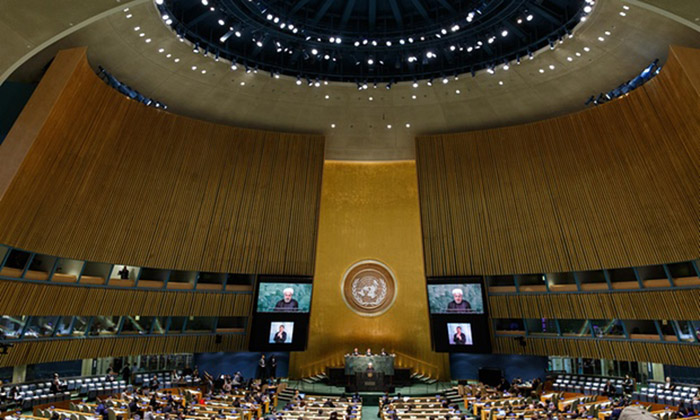The drama will be greater than ever this year, at the 70th session of the UN general assembly, known inside the institution by its acronym Unga (rhyming with hunger). Within the space of two hours on Monday morning, Presidents Barack Obama, Xi Jinping, Vladimir Putin, Hassan Rouhani and François Hollande will take their turn to speak. Each will try to anticipate and respond to the other, seeking rhetorical advantage and one-upmanship in their claims to global leadership. The global balance of power will be laid out in the open.
The greatest wild card this year will be Putin. It will be the first time he has shown up to talk at Unga for a decade, and he flies to New York at a critical time. While he has eased the pressure on Ukraine, dialling down Russia’s covert military campaign alongside the separatists in the east, Putin at the same time has raised his country’s stakes in Syria in support of Bashar al-Assad, setting up an air base in Latakia and consolidating Russia’s hold on a naval base at Tartus.
In so doing, he has backed up by force of arms the argument he has been trying to win since the war started more than four years, and 250,000 lives, ago: that the only road to peace is through support for Assad and a concerted campaign against Isis.
The US, its western allies, and most human rights advocates see the continuing slaughter through an inverse lens. In their view, Isis and other extremist groups are the symptoms of the chaos wrought by the Assad regime through the daily barrel bombing of civilians in rebel areas.
It sounds like a fundamentally different view but it has been based on a bluff that Putin has called. Neither the US nor its European allies are prepared to risk military action to try to remove Assad. They can agree to bomb Isis because it advertises its atrocities online and explicitly threatens the West.
Obama will be co-hosting a summit meeting on countering Isis starting on Tuesday morning. Putin is not expected to attend, as he seeking to claim his own leadership of the anti-Isis campaign.
That iwill be the state of play when Obama meets Putin on Monday afternoon, at what is likely to be the most critical summit of the week. The president will be seeking assurances of Russian agreement to a relatively brisk abdication by Assad (months rather than years) in return for legitimising the Russian boots-on-the-ground campaign in Syria. But right now, those are assurances Putin seems in no mood to give.
Over much of the previous decade, in Putin’s absence, the central drama at Unga has been provided by the Iranian state and its volatile relationship with the US – from Mahmoud Ahmadinejad’s baiting of his American houses to the tentative rapprochement of his successor, Hassan Rouhani.
The symbolic highlight of the Unga in 2013 was a phone conversation between Obama and Rouhani as the latter was in his car heading to the airport. Two years on, US-Iranian exchanges are now routine. A deal on the future of Iran’s nuclear programme was finally clinched in July, and in getting there the US secretary of state, John Kerry, and his Iranian counterpart, Mohammad Javad Zarif, spent more time in each other’s company than any other two foreign ministers on earth.
On Monday, Zarif will be meeting ministers from the six nations who negotiated the nuclear agreement, in order to discuss its implementation. But the White House has said there is still no meeting expected between Obama and Rouhani this year. Rouhani told National Public Radio that Iran was ready to start discussing Syria with the US “right now” but a personal encounter has not been approved by Iran’s Supreme Leader, Ali Khamenei. The nuclear agreement has yet to have a diplomatic domino effect. Iran and the US remain far apart on each other’s role in the Middle East. Iran has reportedly not been invited to Rouhani Obama’s summit on countering Isis.
The White House says, however, that the president will have a brief meeting with Raùl Castro, who will be addressing the general assembly for the first time on Monday afternoon. Obama met the Cuban leader at the Summit of the Americas in Panama in April, and Kerry went to Havana to reopen the US embassy in August, ending a 54-year break in relations. A follow-up Obama-Castro handshake is intended to underline the normalisation in relations, and be another showcase for the benefits of diplomacy. The challenge this year, though, will be making progress in the deeply troubled relationship with Putin, particularly on Syria and Ukraine, and that will be a tougher nut to crack.
More about:















































